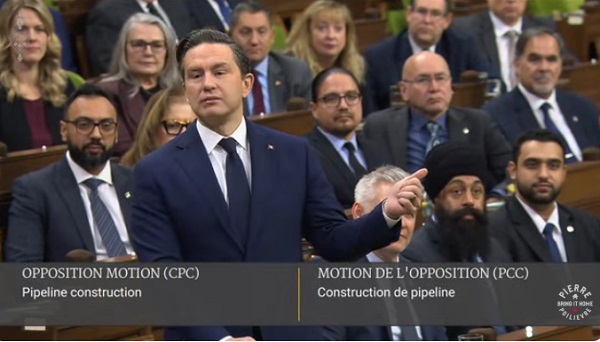Energy
Canadian natural resource minister’s wife invests in oil stocks as gov’t attacks industry

From LifeSiteNews
Records show Tara Wilkinson’s stock purchases include ‘fossil fuel’ producers targeted for eventual elimination by the Liberal government.
The wife of Canadian Natural Resources Minister Jonathan Wilkinson bought oil and gas company stocks, records show, at the same time the federal Liberal government has been attacking the industry in a bid to curb so-called “fossil fuel” use and “fight against climate change.”
According to records as per a recent Blacklock’s Reporter report, Wilkinson’s wife, Tara, amped up her trading in oil and gas stocks last year in Enbridge Incorporated and Shell PLC. The records were found filings under Canada’s Conflict of Interest Code for Members of the House of Commons.
Records show Mrs. Wilkinson also has shares in the globalists linked BlackRock Inc., Amazon, and Finning International Inc., the military-industrial complex linked to Lockheed Martin Corporation, along with COVID jab promoting Pfizer and 3M Company. She also holds stock in Royal Bank and Toronto Dominion Bank.
As early as December, Wilkinson boasted that “Canada became the first oil and gas producer in the world to put a cap on oil and gas emissions.”
He also has claimed that he is looking out for his family’s future by promoting federal climate programs.
Indeed, in 2021, he said he would “honour the commitments we made to our children that we’re going to leave them something that is a workable and sustainable world,” claiming “climate change” is the “existential issue of our time.”
He also claimed, despite his wife and by extension family profiting off oil and gas companies, that “we are on a trajectory to reducing to net zero by 2050” and that “it is important in our fight against climate change.”
Other current and former Liberal cabinet ministers also have oil and gas stocks, such as former Addictions Minister Carolyn Bennett, former Attorney General David Lametti and current Veterans Affairs Minister Ginette Petitpas Taylor.
Oil and gas companies have been racking in high profits due to both a high demand for oil and gas and higher oil prices.
The federal government under Prime Minister Justin Trudeau since 2015 has pushed a radical environmental agenda similar to the agendas being pushed the World Economic Forum’s “Great Reset” and the United Nations “Sustainable Development Goals.”
Late last year, the Trudeau government forged ahead with many policies that if they come to full fruition will destroy Canada’s oil and gas industry, which provides jobs to thousands and is important in Alberta and Saskatchewan.
At COP28 held late last year, Environment Minister Steven Guilbeault unveiled a plan to slash oil and gas emissions by 35% to 38% below 2019 levels. He claimed that it is important to reach “carbon neutrality in Canada by 2050.”
At COP28, he announced a new Liberal federal government climate policy that aims to incentivize beef cattle ranchers to reduce how much gas their cows emit by giving them feed additives.
A recent near power blackout in Alberta due to the failure of wind and solar power, however, highlights how so-called sustainable wind and solar power, which the Trudeau government heavily promotes, are not a good fit for Canada’s cold climate.
Alberta Premier Danielle Smith has blasted Guilbeault as a “menace” for going after her province and the oil and gas industry in general and vowed to fight him with every tool available to her government.
The Trudeau government has also pledged to mandate that all new cars and trucks by 2035 be electric, which would in effect ban the sale of new gasoline- or diesel-only powered vehicles after that year.
The reduction and eventual elimination of the use of so-called “fossil fuels” and a transition to unreliable “green” energy has also been pushed by the World Economic Forum (WEF) – the globalist group behind the socialist “Great Reset” agenda – an organization in which Trudeau and some of his cabinet are involved.
A June 2017 peer-reviewed study by two scientists and a veteran statistician confirmed that most of the recent global warming data have been “fabricated by climate scientists to make it look more frightening.”
There have been two recent court rulings that have dealt a blow to Trudeau’s environmental laws, however.
The most recent was the Federal Court of Canada on November 16 overturned the Trudeau government’s ban on single-use plastic, calling it “unreasonable and unconstitutional.”
The second ruling comes after Canada’s Supreme Court recently sided in favor of provincial autonomy when it comes to natural resources. The Supreme Court recently ruled that Trudeau’s law, C-69, dubbed the “no-more pipelines” bill, is “mostly unconstitutional.” This was a huge win for Alberta and Saskatchewan, which challenged the law in court. The decision returned authority over the pipelines to provincial governments, meaning oil and gas projects headed up by the provinces should be allowed to proceed without federal intrusion.
The Trudeau government, however, seems insistent on defying the recent rulings by pushing forward with its various regulations.
Business
Looks like the Liberals don’t support their own Pipeline MOU

From Pierre Poilievre
Alberta
They never wanted a pipeline! – Deputy Conservative Leader Melissa Lantsman

From Melissa Lantsman
Turns out the anti-development wing of the Liberal Party never stopped running the show.
Today, we’ll see if the Liberals vote for the pipeline they just finished bragging about.
Spoiler: they won’t. Because with the Liberals, the announcements are real, but the results never are.
-

 COVID-192 days ago
COVID-192 days agoUniversity of Colorado will pay $10 million to staff, students for trying to force them to take COVID shots
-

 Bruce Dowbiggin2 days ago
Bruce Dowbiggin2 days agoIntegration Or Indignation: Whose Strategy Worked Best Against Trump?
-

 Focal Points2 days ago
Focal Points2 days agoCommon Vaccines Linked to 38-50% Increased Risk of Dementia and Alzheimer’s
-

 espionage2 days ago
espionage2 days agoWestern Campuses Help Build China’s Digital Dragnet With U.S. Tax Funds, Study Warns
-

 Opinion2 days ago
Opinion2 days agoThe day the ‘King of rock ‘n’ roll saved the Arizona memorial
-

 Bruce Dowbiggin2 days ago
Bruce Dowbiggin2 days agoWayne Gretzky’s Terrible, Awful Week.. And Soccer/ Football.
-

 Agriculture2 days ago
Agriculture2 days agoCanada’s air quality among the best in the world
-

 Health1 day ago
Health1 day agoCDC Vaccine Panel Votes to End Universal Hep B Vaccine for Newborns






